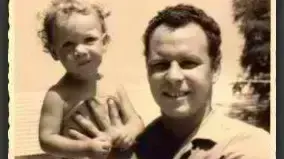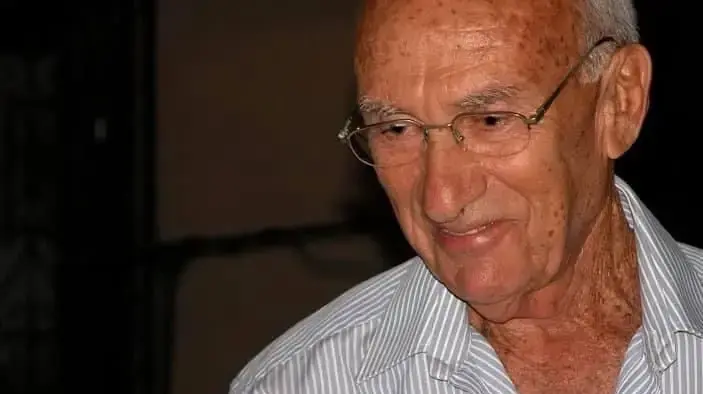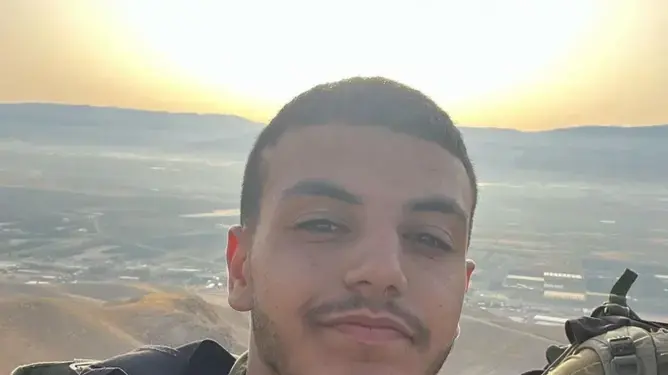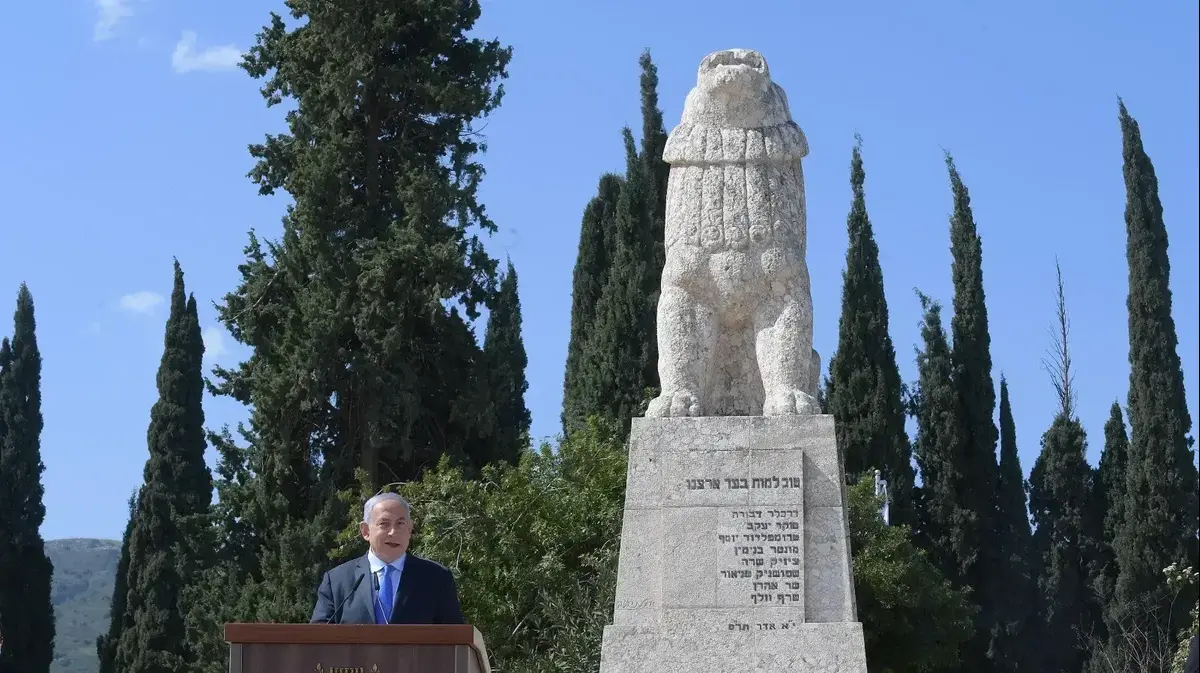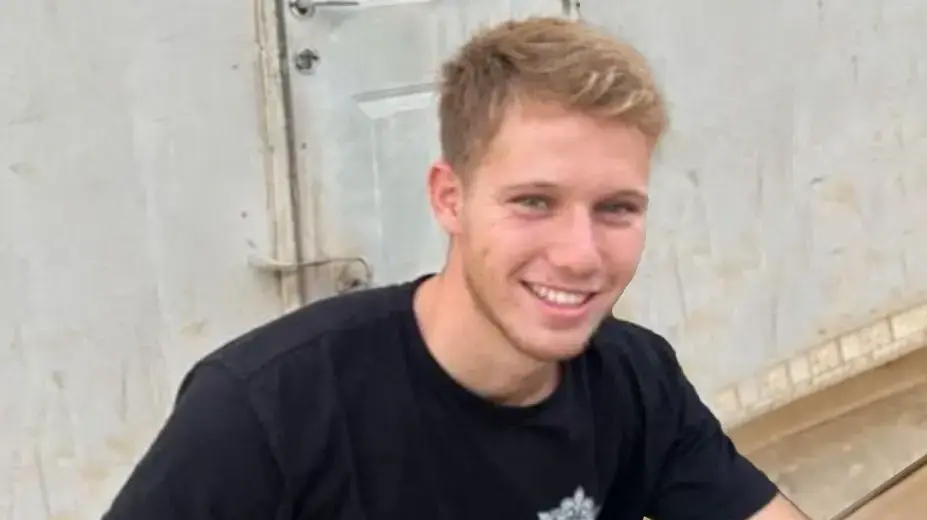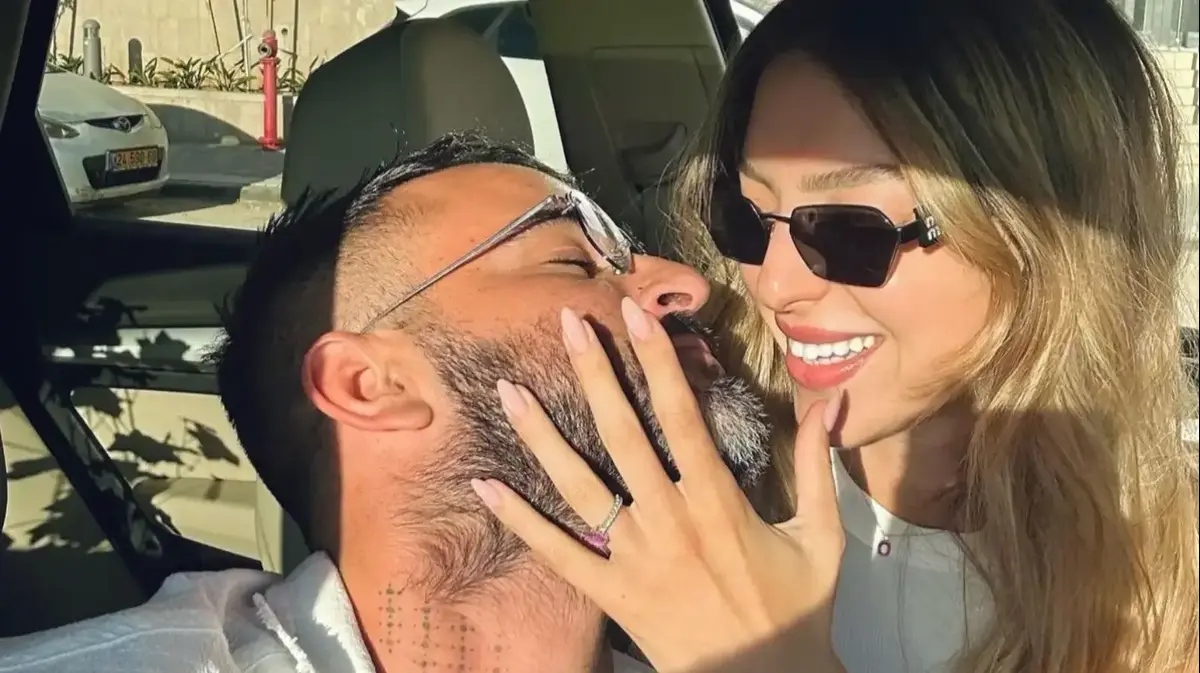marching song
Two weeks after losing his parents, a member of the kibbutz enlisted in the paratroopers.
Since then he has walked in his own special way
In 1954, Gershom Zaharhari's parents were killed in a disaster in Maagan, in which a plane that dropped a letter from President Ben-Zvi on the occasion of the inauguration of a monument on the kibbutz crashed.
The person who kept in touch with him and supported him over the years was none other than the president's wife, Rachel Yanait Ben Zvi, among whom a correspondence was kept.
This week he passed away and was buried next to his parents
Eli Ashkenazi
21/05/2022
Saturday, 21 May 2022, 13:20 Updated: 15:23
Share on Facebook
Share on WhatsApp
Share on Twitter
Share on Email
Share on general
Orphaned from his parents two weeks before he enlisted in the army.
Gershom and his parents, Mola and Rachel (Photo: Official website, Afikim Archive)
In Kibbutz Afikim, Gershom Zaharhari, a son of Afikim and one of the first fighters in the patrol company in the 890th Battalion of the Paratroopers, who later became the Paratroopers' Brigade, passed away.
He was 86 at the time of his death.
Gershom was the eldest son of Shmuel (Mola) and Rachel Zahharari.
His parents were educators and were revered instructors of youth societies made up of boys who immigrated to Israel from many countries.
Among his father's many trainees was also the boy Peretz Goldstein, one of the founders of Kibbutz Maagan and the paratroopers of the Jewish community during World War II in Europe, where he was captured by the Gestapo and murdered.
On the tenth anniversary of the parachute, during the inauguration of a monument in Goldstein's memory, at Kibbutz Maagan, a plane crashed into the crowd.
17 people were killed, including Molla and Rachel Zoharari.
The couple were friends of the second president, Yitzhak Ben-Zvi, and his wife, Rachel Yanait Ben-Zvi.
The file, which is in the Yad Ben Zvi and the state archives, contains letters sent over the years by the president's wife to deport them, in which she is interested in the safety and well-being of his two younger brothers, and later is interested in the safety of his children.
For example, on February 10, 1961, Yanait Ben-Zvi writes to Gershom that she and the president will come to Beit Keshet for another two weeks, for the annual memorial service for their son, Ali, and his six friends who were killed in battle in the fields of Beit Keshet during the War of Independence.
"It is possible that that evening we will be in Tiberias and you will then be able to approach me," his wife and Ziva write to him.
More on Walla!
Full of dietary fiber and cholesterol-free: everything you did not know about Israeli pear
In collaboration with Galil
Zoharari in the middle with his parents, Mola and Rachel and his brother, Nurit and Yossi (Photo: Official website, Afikim Archive)
At their wedding a few months earlier, she did not come and apologized: "Since my son fell on me I can not attend private celebrations, otherwise I would have come to you," she wrote.
Ali Ben Zvi was killed at the age of 24, a few days before his wedding to Pnina Daromi, a 20-year-old principal.
Rachel Yanait Ben-Zvi lives in the shadow of the heavy loss and the feeling of missing out on the family her son did not manage to establish.
She understood Gershom's soul, then an 18-year-old boy who had just enlisted in the army.
It is possible that these were the figures of Peretz Goldstein, his father's trainee, or Itamar Golani of his kibbutz, the first space among the IDF paratroopers, who stood in front of his eyes when he enlisted as a paratrooper.
Letter that Gershom sent to the president's wife about a month after he enlisted (Photo: Official website, State Archives)
His father, Molla, grew up in a traditional house on the banks of the Dnieper.
After immigrating to Eretz Israel, he was one of the founders of Kibbutz Afikim.
The kibbutz was still in the Kinneret courtyard at the time, and it was said that a stranger who happened to be there might think he was in a Russian kolkhoz, because all the members spoke Russian to each other.
"Among the individuals of virtue who stood as a wall in the form of the guard of culture and the Hebrew language in the same court was Molla (Shmuel), the man of work and the man of book and study.
He was the man who led the cultural life of the young kibbutz, wrote hymns and plays, and also translated and directed plays.
One of the plays he translated was "Sunset."
The play was staged by the dramatic circle of Kibbutz Afikim in a shed that was also used to store planes for the first pilot course held by the Jewish community in Eretz Israel.
On the translation of Molla, the poet Leah Goldberg wrote that she came to watch the play: "The translation work is clean, and sometimes it also has the penetration of the spirit of the play."
When immigrant boys began to arrive in Eretz Israel, education became the center of his life in front of her.
He devoted his entire life to the young boys, trainees of youth societies who came to Afikim from different countries.
The boys who came from Syria and formed the "Shibulat" youth society later recounted how in front of her, Zaharari made sure to respect the tradition of the father and mother house on which they grew up, how he spent hours with them, more than with his three biological children.
They told how in front of her he revived the Bible for them in stories and trips and kept the tradition of the father's house on Saturdays and holidays. Gershom was for them as the eldest brother.
In the center: the educator in front of her and next to him his son Yossi, and on the right Bilha Ronen, who takes care of the children from the immigrant class from Syria (Photo: Afikim Archive)
Gershom's home also had cultural worlds that stemmed from both Jewish sources and Russian literature, and he was the first child in Afikim to celebrate a bar mitzvah.
As a high school student, he instructed the seventh and eighth grade children in Afikim.
A few days before Gershom enlisted in the army, his parents went to a ceremony at the neighboring kibbutz, Maagan.
The excitement in the Jordan Valley was great and about 2,500 people came to the ceremony where a plane was expected to surprise the audience and throw a greeting card from the president, Yitzhak Ben-Zvi.
The plane crashed into the crowd and the mass disaster caused shock across the country.
Gershom's younger brothers, 12-year-old Nurit and 7-year-old Yossi, were not told that their parents had been killed.
"Everyone assumed that they would understand for themselves. They understood that father and mother were not at home," Assaf Inbari wrote in his book "Home."
Mullah Zaharhari is one of the book's protagonists.
Gershom was already 18 years old and well aware of the disaster that befell him and his two younger brothers.
Two weeks later he enlisted in the Paratroopers Regiment.
In the Spartan Israel of those days it did not seem problematic to recruit a boy who a few days ago lost both his parents.
The unit that Gershom came to was then considered one of the best in the IDF. The highest quality into which I carried my destiny. During the years of my life I have been in many places, in many groups of people, in different units, in many countries, between people at different levels. So special, cohesive and invested, a bunch of the bravest, smartest, funniest and funniest people; people who went everywhere, fought all the wars and stormed all the hills and never asked, just gave ... When I remember my friends and commanders ever since, I know I swam with elephants. "
The correspondence between the president's wife and Gershom began while he was in training.
Letter sent by Rachel to their expulsion (Photo: Official website, State Archives)
The correspondence between the president's wife and Gershom began while he was in training.
"Gershom, my good boy," she wrote to him and then the whole letter was blackened.
So did the letter he sent her back from the rookie base.
It seems that personal things were written there by the grief-stricken boy and so were the bereaved mother's answers to the young soldier.
He had to bear the pain alone, without support, in silence.
While their expulsion went through arduous training and he participated with his friends in a series of retaliatory actions beyond the borders of Israel and later, in the Holy War, and fell with them in Mitla - their two younger brothers were raised by their aunt, Simka Schmuckler, their mother Rachel's sister.
Seven years earlier she was a fighter in Palim. When she was only 25, she was asked to travel to France, board the illegal immigrant ship "Exodus" and was appointed in charge of medical service on the ship.
During his military service, Gershom occasionally visited the President's House.
When he was in a line near Jerusalem, he would come in the evenings to take a shower in the house of citizen number one.
"We loved receiving it," Rachel Yanait Ben-Zvi later wrote to Rachel Zaharhari, Gershom's daughter.
She further told her that after her grandparents perished in the disaster and her father "was a young elm ... he was very depressed and I tried to bring him closer as a family member".
Letter sent by Rachel to their divorcee on the occasion of his marriage to Ziva (Photo: Official Website, State Archives)
When Gershom was discharged from the army, he began working as a driver in the transportation industry of his kibbutz, Afikim.
Most of the work was transporting logs from the port of Haifa to the Afikim plywood plant, as well as long-day trips to the oil fields in Sinai, after the Six Day War.
He has been driving the truck for more than fifty years, even as a reservist for many years.
He later also worked as a vehicle dispatcher for the kibbutz movement and later as a property and service man in the agricultural garage of the regional factories in the plant.
In 1960 he married his girlfriend Ziva for Ashdot Yaakov.
At the wedding he wore black trousers, a white shirt and wore the paratroopers' red beret.
"Gershom understood my excitement for your wedding day and you are like my son, after your parents perished so tragically," Rachel Yanait Ben Zvi, the president's wife, wrote to him when the letter he wrote was thrown.
"I once swam to you about my last conversation with Mom and Dad about you, who would take care of your future - how happy they would be if they had the privilege of seeing you, you and Ziva, on your wedding day."
Then she apologized for not coming to the wedding and finished - "From the bottom of my heart I will bless you and wish you to live happily in the spirit of your parents - a life of toil and spirit in the kibbutz."
A photo sent by Zaharhari to the president's wife, in which he and his son Shai are photographed (Photo: Official website, State Archives)
A year later Gershom and Ziva's eldest son was born and they called me Shai.
Gershom sent the president's wife a picture in which he is holding the little gift, and on the back of the picture is written: "To Grandma Rachel, the distant one is close, affectionately silk Zoharhari."
Shai had a grandmother, Rachel, who was killed seven years before he was born, and a grandmother, Rachel, at the President's house.
Three years later Gershom was born and her second daughter Ziva was named Rachel, after her grandmother.
In honor of her birth, Rachel Yanait Ben Zvi came to Afikim to greet the young couple and see the baby.
Three years later a third child was born - Omar.
Gershom was known for his ingenuity and, among other things, built an omega facility, similar to a facility that is practiced in an IDF parachuting course, and which the kibbutz children surf at during the State of Israel's Independence Day celebrations.
Like his father, he wrote songs. To his parents:
Letter from Rachel Yanait Ben Zvi to Gershom Zoharari (Photo: Official Website, State Archives)
"Even if for a moment the parents would get up
to
join their hovering soul, what we would look like with an unadulterated eye,
living
with them, they were supposed to drip well, and be modest ... "As
she
insisted
, how far away were she?" She would ask
.
Zoharhari's house, Rachel, with her brother Ali, named after the son of President Ben Zvi and his wife (Photo: Official Website, State Archives)
In 1976, the youngest son of Gershom and Ziva was born, named after him, after Rachel Yanait Ben Zvi's son who had been killed in a battle at Beit Keshet 28 years earlier.
This time the correspondence in the archive file is between Rachel Hilda Afikim and Rachel Yanait Ben Zvi.
When the toddler Ali is a year and a half old, Rachel the girl tells in her letter to 91-year-old Rachel about her family members and the mischief of little Ali.
On Wednesday, Gershom Zoharari was laid to rest, near his parents' graves.
The funeral procession was accompanied by the song "Badumia", a song he loved and was sung by Lior Yeni, a childhood friend.
news
News in Israel
Events in Israel
Tags
Yitzhak Ben-Zvi
Paratroopers
Afikim

